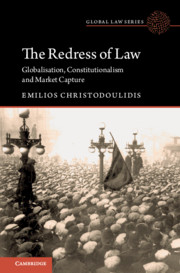Book contents
- Reviews
- The Redress of Law
- Global Law Series
- The Redress of Law
- Copyright page
- Dedication
- Contents
- Acknowledgements
- Introduction
- Part I Political Phenomenology
- 1.1 Hannah Arendt and the Theory of the Bourgeois Public Sphere
- 1.2 Simone Weil: Necessity and Courage
- 1.3 The Phenomenology of Work
- 1.4 Towards a Critical Phenomenology
- Part II Political Constitutionalism
- Part III Market Constitutionalism
- Part IV Strategies of Redress
- Epilogue
- References
- Index
1.3 - The Phenomenology of Work
from Part I - Political Phenomenology
Published online by Cambridge University Press: 26 March 2021
- Reviews
- The Redress of Law
- Global Law Series
- The Redress of Law
- Copyright page
- Dedication
- Contents
- Acknowledgements
- Introduction
- Part I Political Phenomenology
- 1.1 Hannah Arendt and the Theory of the Bourgeois Public Sphere
- 1.2 Simone Weil: Necessity and Courage
- 1.3 The Phenomenology of Work
- 1.4 Towards a Critical Phenomenology
- Part II Political Constitutionalism
- Part III Market Constitutionalism
- Part IV Strategies of Redress
- Epilogue
- References
- Index
Summary
What in Hegel’s philosophy is the original breach in which Spirit is severed from itself and thereby sets the dialectic of History in motion, finds materialist expression in Marx as class conflict. Where in the Phenomenology Spirit grasps contradiction as two aspects of an unfolding process and collects the brokenness of the contradictory elements of reality in the movement that synthesises them, in Marx that brokenness is played out on the terrain of social labour, in the activity, as he puts it, of producing the world. The history of all hitherto societies, famously in Marx, is the history of class conflict, in other words, the succession of states of brokenness. What drives forward the dialectic of history, the supersession of the successive states of breach, is the development of the forces of production that carries with it the unfolding of class conflict, changing as it develops the nature of both class relations and needs: both are caught up in the historical dynamic of redefinition. Conflict – material, embodied, waged, suffered – is, in Marx’s materialisation of Hegel’s breach, the very condition of history: it pushes it forward, because history cannot be reconciled with any of the contradictory states through which it passes. It founds the promise of its eventual consummation in the authentic human community that the working class as universal class will have brought about ‘for itself’. If history, then, will have been the eventual recollection as a unity of the mutilated fragments, the current historical conjuncture, absent the guarantee of retrospection, comprehends reality in the partial and revisable ways in which theory may reflect the current fragmented experience of the class-conflictual situation. ‘Fragmented’ captures what it means to come face-to-face with forms of suffering that offer no handle to their comprehension, let alone redemption.
- Type
- Chapter
- Information
- The Redress of LawGlobalisation, Constitutionalism and Market Capture, pp. 72 - 118Publisher: Cambridge University PressPrint publication year: 2021

